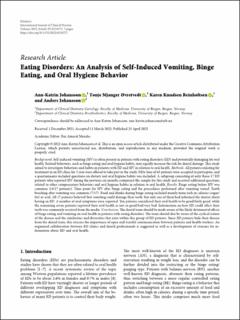| dc.contributor.author | Johansson, Gerd Ann-Katrin Janmyr | |
| dc.contributor.author | Mjanger Øvretvedt, Tone | |
| dc.contributor.author | Reinholtsen, Karen Knudsen | |
| dc.contributor.author | Johansson, Anders Arne | |
| dc.date.accessioned | 2023-01-11T09:56:35Z | |
| dc.date.available | 2023-01-11T09:56:35Z | |
| dc.date.created | 2023-01-09T14:36:14Z | |
| dc.date.issued | 2022 | |
| dc.identifier.issn | 1368-5031 | |
| dc.identifier.uri | https://hdl.handle.net/11250/3042618 | |
| dc.description.abstract | Background. Self-induced vomiting (SIV) is often present in patients with eating disorders (ED) and potentially damaging for oral health. Related behaviors, such as binge eating and oral hygiene habits, may equally increase the risk for dental damage. This study aimed to investigate behaviors and habits in patients with ED and SIV in relation to oral health. Methods. All patients enlisting for treatment in an ED clinic for 1 year were offered to take part in the study. Fifty-four of 65 patients were accepted to participate, and a questionnaire included questions on dietary and oral hygiene habits was included. A subgroup consisting of only those 17 ED patients who reported SIV during the previous six months comprised the sample for this study and received additional questions related to other compensatory behaviors and oral hygiene habits in relation to oral health. Results. Binge eating before SIV was common (14/17 patients). Time point for SIV after binge eating and the procedures performed after vomiting varied. Tooth brushing after vomiting was common (7/17). Food and drinks during binge eating included mainly items rich in calories (sugar/fat) or acid. All 17 patients believed that vomiting could damage their teeth, but only one of them had informed the dentist about having an ED. A number of oral symptoms were reported. Ten patients considered their oral health to be good/fairly good, while the remaining seven patients reported their oral health as not so good/bad/very bad. Information on how ED could affect their teeth was commonly received from the media. Conclusions. The dental team should be made aware of the likely detrimental effects of binge eating and vomiting on oral health in patients with eating disorders. The team should also be aware of the cyclical nature of the disease and the similarities and diversities that exist within this group of ED patients. Since ED patients hide their disease from the dental team, this stresses the importance of open and trustful communication between patients and health workers. An organized collaboration between ED clinics and dental professionals is suggested as well as a development of avenues for information about ED and oral health. | en_US |
| dc.language.iso | eng | en_US |
| dc.publisher | Hindawi | en_US |
| dc.rights | Navngivelse 4.0 Internasjonal | * |
| dc.rights.uri | http://creativecommons.org/licenses/by/4.0/deed.no | * |
| dc.title | Eating Disorders: An Analysis of Self-Induced Vomiting, Binge Eating, and Oral Hygiene Behavior | en_US |
| dc.type | Journal article | en_US |
| dc.type | Peer reviewed | en_US |
| dc.rights.holder | Copyright 2022 The Author(s) | en_US |
| dc.source.articlenumber | 6210372 | en_US |
| cristin.ispublished | true | |
| cristin.qualitycode | 1 | |
| dc.identifier.doi | 10.1155/2022/6210372 | |
| dc.identifier.cristin | 2103416 | |
| dc.source.journal | International journal of clinical practice | en_US |
| dc.identifier.citation | International journal of clinical practice. 2022, 2022, 6210372. | en_US |
| dc.source.volume | 2022 | en_US |

